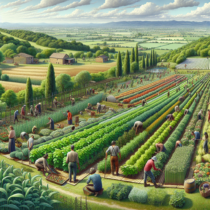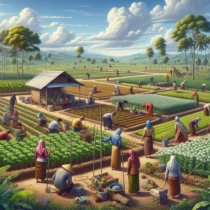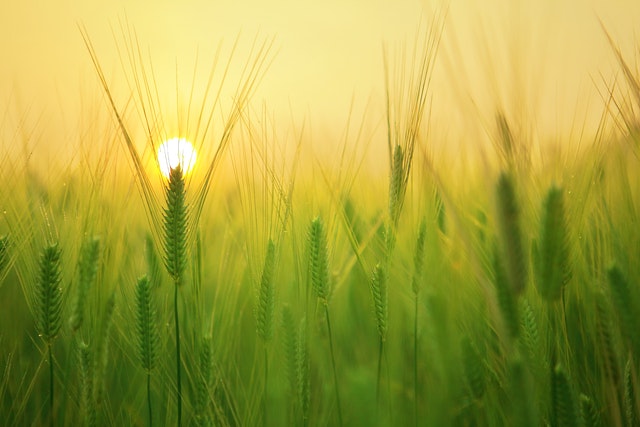
Scholarship Name: Agricultural Studies Scholarship in Kenya, 2025
4 min read
Country: Kenya
Description: In The Rapidly Evolving Fields Of Agriculture And Environmental Science, Opportunities For Academic Advancement Are Crucial. The Agricultural Studies Scholarship In Kenya, 2025, Stands As A Beacon For Aspiring Scholars Passionate About Farming, Sustainability, And Rural Development. Sponsored By The Distinguished Kenya Agricultural Research And...

Scholarship Name: Agricultural Studies Fellowship in Kenya, 2024
4 min read
Country: Kenya
Description: In A Groundbreaking Initiative Aimed At Fostering Agricultural Innovation And Sustainability, The Agricultural Studies Fellowship In Kenya For 2024 Promises To Be An Extraordinary Opportunity For Budding Agriculturists. The Fellowship Is Set To Offer Participants Not Just Theoretical Knowledge But Hands-on Experience That Could Significantly...

Scholarship Name: $5,000 Agricultural Studies Fellowship in New Zealand, 2024
4 min read
Country: New Zealand
Description: The Year 2024 Brings An Exciting Opportunity For Individuals Passionate About Agriculture. A $5,000 Agricultural Studies Fellowship Is Now Available In New Zealand, Aimed At Supporting Students And Professionals Wishing To Advance Their Knowledge And Contribute To The Sector's Growth. This Fellowship Seeks To Attract...

Scholarship Name: $10,000 Agricultural Sciences Scholarship in USA, 2024
3 min read
Country: United States
Description: The United States Continues To Be A Beacon Of Opportunity For Students Worldwide. In 2024, A Special Opportunity Arises For Those Passionate About Agricultural Sciences: A $10,000 Scholarship Aimed At Fostering The Next Generation Of Innovators And Leaders In This Critical Field. Host Organization: Cultivating...

Scholarship Name: $2,400 Agricultural Research Scholarship in Brazil, 2025
3 min read
Country: Brazil
Description: Brazil Is A Land Of Vibrant Cultures, Stunning Landscapes, And An Ever-evolving Agricultural Sector. For Students Passionate About Agriculture And Eager To Make A Difference, The $2,400 Agricultural Research Scholarship In Brazil For 2025 Could Be A Life-changing Opportunity. This Scholarship Not Only Provides Financial...

Scholarship Name: $5,900 Agricultural Sciences Scholarship in Germany, 2025
3 min read
Country: Germany
Description: In An Era Where Global Food Security And Sustainable Farming Practices Are Becoming Increasingly Critical, Opportunities To Advance One's Knowledge In Agricultural Sciences Are Highly Sought After. One Such Opportunity Is The $5,900 Agricultural Sciences Scholarship In Germany For The Year 2025. This Scholarship Is...

Scholarship Name: $500 Agricultural Studies Grant in Brazil, 2024
4 min read
Country: Brazil
Description: In An Exciting New Development For Students Passionate About Agriculture And Sustainability, The $500 Agricultural Studies Grant In Brazil For 2024 Has Been Announced. This Grant Aims To Support Aspiring Agricultural Professionals By Providing Financial Assistance To Students Who Plan To Pursue Studies Or Research...

Scholarship Name: $8,000 Agricultural Sciences Stipend in Belgium, 2024
3 min read
Country: Belgium
Description: The Agricultural Sciences Field Is A Cornerstone Of Our Global Food System, Influencing Everything From What We Eat To How We Interact With The Environment. For Students And Researchers In This Domain, Opportunities For Financial Support Are Invaluable. One Such Opportunity Is The $8,000 Agricultural...

Scholarship Name: $13,500 Organic Farming Initiative Italy, 2024
3 min read
Country: Italy
Description: Italy Is Not Just A Country Of Historical Landmarks, Picturesque Landscapes, And Culinary Delights; It's Also A Burgeoning Hub For Sustainable Agriculture. In 2024, An Exciting Opportunity Awaits Those Passionate About Organic Farming: The $13,500 Organic Farming Initiative. This Initiative Provides Aspiring Farmers And Environmental...

Scholarship Name: $3,800 Agricultural Studies Bursary in Brazil, 2024
3 min read
Country: Brazil
Description: The Opportunity To Gain Hands-on Experience In The Field Of Agriculture While Exploring A Vibrant And Dynamic Country Has Just Become Available Through The $3,800 Agricultural Studies Bursary In Brazil For 2024. This Bursary Is An Exceptional Chance For Students Passionate About Agriculture To Enhance...

Scholarship Name: Agriculture Innovation $900 Grant in Kenya, 2024
3 min read
Country: Kenya
Description: The Agriculture Innovation $900 Grant Is A Remarkable Initiative By The Global Agricultural Development Foundation (GADF). GADF Is A Non-profit Organization Dedicated To Fostering Sustainable Agricultural Practices And Technological Innovation In Agriculture Worldwide. Established Over Two Decades Ago, GADF Has Continually Empowered Farmers, Researchers, And...

Scholarship Name: Sustainable Agriculture Scholarship in Thailand, 2024
4 min read
Country: Thailand
Description: Sustainable Agriculture Scholarship In Thailand, 2024 Thailand, A Country Known For Its Vibrant Culture, Stunning Landscapes, And Rich History, Is Taking Significant Strides In The Field Of Sustainable Agriculture. The Introduction Of The Sustainable Agriculture Scholarship In Thailand For The Year 2024 Marks A Remarkable...

Scholarship Name: Agricultural Achievements Boost in Nigeria, 2024
3 min read
Country: Nigeria
Description: In 2024, Nigeria Stands At The Forefront Of Agricultural Innovation And Productivity, Showcasing Remarkable Achievements That Promise To Reshape Its Economy And The Well-being Of Its Populace. This Progress Is Largely Attributed To Concerted Efforts From Key Stakeholders Including The Government, Local Farmers, Agribusinesses, And...

Scholarship Name: Agriculture Excellence Scholarship, Canada 2024
4 min read
Country: Canada
Description: Agriculture Excellence Scholarship, Canada 2024: Cultivating Future Leaders In Agronomy Agriculture Has Always Been The Backbone Of Human Civilization, And Advancing This Crucial Sector Remains Pivotal For Global Prosperity. Recognizing The Importance Of Nurturing Emerging Talent In Agronomy, The Canadian Agriculture Excellence Scholarship Has Been...

Scholarship Name: Agriculture Sustainability $3,500 Grant in New Zealand, 2025
3 min read
Country: New Zealand
Description: Agriculture Plays A Pivotal Role In The Global Economy, Providing The Backbone For Food Security And Employment. As Concerns About Climate Change And Environmental Sustainability Escalate, The Agriculture Sector Must Adapt To Ensure Long-term Viability. Recognizing This Imperative, A $3,500 Grant For Agricultural Sustainability Has...

Scholarship Name: $3,000 Agriculture and Food Security Grant in Italy, 2025
3 min read
Country: Italy
Description: In 2025, Italy Will Offer A Unique Opportunity For Individuals Passionate About Agriculture And Food Security. A $3,000 Grant Is Available To Support Innovative Projects Aimed At Enhancing Sustainable Farming Practices And Ensuring Food Security. This Article Provides A Comprehensive Overview Of This Grant, The...

Scholarship Name: Agriculture and Food Security Grant in Italy, 2025
3 min read
Country: Italy
Description: In 2024, Italy Will Offer An Incredible Opportunity For Individuals Passionate About Agriculture And Food Security. The $3,000 Agriculture And Food Security Grant Aims To Support Innovative Projects That Enhance Sustainable Farming Practices And Ensure Food Security. This Blog Post Provides An Overview Of The...

Scholarship Name: $1,500 Future of Farming Fund in Australia, 2024
4 min read
Country: Australia
Description: In 2024, The Australian Agricultural Sector Is Poised For Significant Transformation With The Introduction Of The $1,500 Future Of Farming Fund. This Initiative Aims To Empower Aspiring Farmers, Innovators, And Researchers By Providing Financial Support To Those Committed To Advancing Sustainable Farming Practices. This Article...

Scholarship Name: Veterinary Medicine $1,100 Scholarship in Denmark, 2024
4 min read
Country: Denmark
Description: In The Academic Year 2024, An Exciting Opportunity Awaits Aspiring Veterinary Students: The Veterinary Medicine $1,100 Scholarship In Denmark. This Scholarship Has Been Designed To Support And Encourage Students Who Are Passionate About Animal Health And Welfare. This Article Will Provide All The Essential Details...

Scholarship Name: Agribusiness Management $11,500 Scholarship in Japan, 2024
4 min read
Country: Japan
Description: # Agribusiness Management $11,500 Scholarship In Japan, 2024 Agribusiness Is A Critical Sector That Fuels The Global Economy And Ensures Food Security. To Promote This Vital Field, A Remarkable Opportunity Has Emerged For Students Worldwide. The Agribusiness Management $11,500 Scholarship In Japan For 2024 Aims...

























The scholarship programs are very essential in boosting human capital development especially in less developed countries in Africa.
Scholarship programs play a crucial role in enhancing human capital development, particularly in less developed countries in Africa. These programs provide opportunities for individuals to access quality education and training, which is essential for their personal growth and the development of their communities and nations.
Firstly, by offering scholarships, these programs enable talented individuals who lack financial resources to pursue higher education without the burden of heavy tuition fees. This helps alleviate the financial barriers that often prevent many students from accessing education, particularly in low-income countries. By investing in their education, these individuals are equipped with the knowledge and skills needed to contribute meaningfully to the development of their societies.
Secondly, scholarship programs often target specific fields or sectors that are crucial for national development. For instance, scholarships may be awarded to students pursuing degrees in science, technology, engineering, or mathematics (STEM) disciplines. By focusing on these areas, scholarship programs help address the shortage of skilled professionals in key sectors that are vital for economic growth and innovation.
Moreover, scholarship recipients often become ambassadors for change in their communities. As they acquire knowledge and skills through education abroad or at reputable institutions within their own countries, they bring back valuable expertise and experiences that can be shared and applied locally. This contributes to building a strong network of professionals who can drive positive change within various sectors.
Additionally, scholarship programs have a multiplier effect on society by promoting inclusivity and equity in education. They help address gender disparities by prioritizing female applicants who have historically faced significant barriers to accessing education. By empowering women through scholarships, these programs not only enhance gender equality but also contribute to socio-economic development as women play a crucial role in driving positive change within their families and communities.
In conclusion, scholarship programs play a vital role in boosting human capital development in less developed countries in Africa. By providing opportunities for individuals who lack financial resources to access quality education and training, these programs enable them to acquire knowledge and skills necessary for personal growth and societal development. Furthermore, scholarship recipients become catalysts for change and contribute to addressing skills gaps in key sectors, promoting inclusivity, and driving long-term sustainable development.